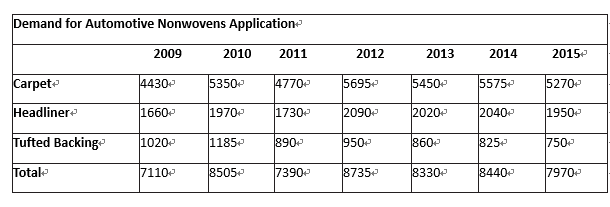Demand trending downward as production slows.
By Kin Ohmura
Osaka Marketing
The scale of demand for nonwovens for automobiles is large, however demand has been sluggish in recent years due to a slowdown in automotive production in Japan. Table one shows demand for nonwovens for automotive carpets, headliners and tufted backings.
Carpets used in automotive cabins, trunks and luggage floors are made with needle punch nonwovens. Tufted carpets are competing with nonwoven carpets but demand for nonwoven carpets is more than 50 million square meters, which is much greater than demand for tufted carpets. Headliners are made from linted materials that stick on interior ceilings. These ma- terials are typically made with a tricot technology or a needle- punched nonwovens process. Tricots are generally used for high class vehicles and nonwovens are used in middle class and standard vehicles. In 2012-2014, demand for nonwoven head- liners exceeded 20 million square meters, however, in 2015 it was only 19.5 million square meters due to a decline in auto- mobile production.
Polyester spunbond nonwovens are used for tufted carpet backings, however, demand for these backings are trending downward because automotive interior carpets have shifted from tufted to needle punched nonwovens.
Manufacturing Trends
Companies including Otsuka, Sun Chemical, Suminoe Textile, Toabo Material and Kureha produce needle punch nonwovens for carpets and these five companies account for 77% of the total production. Nonwovens for ceiling panels are produced by six companies: Japan Vilene, Otsuka, Suminoe Textile, Dynic, Kureha, and Kanai Juyo Kogyo.
The share of the two largest companies, Japan Vilene and Otsuka, is 74%. Spunbonded nonwovens for tufted backings are sold by Unitika, Toyobo and Freudenberg Spunweb Japan. Freudenberg Spunweb Japan imports and sells from Taiwan.
Demand for vehicles in Japan is not expected to increase in the future due to a declining population, therefore automobile man- u factures’ are ramping up overseas production. Consequently, nonwovens manufacturers are also expanding overseas production, and stagnation within the Japanese automotive market is becoming apparent.
Table1
